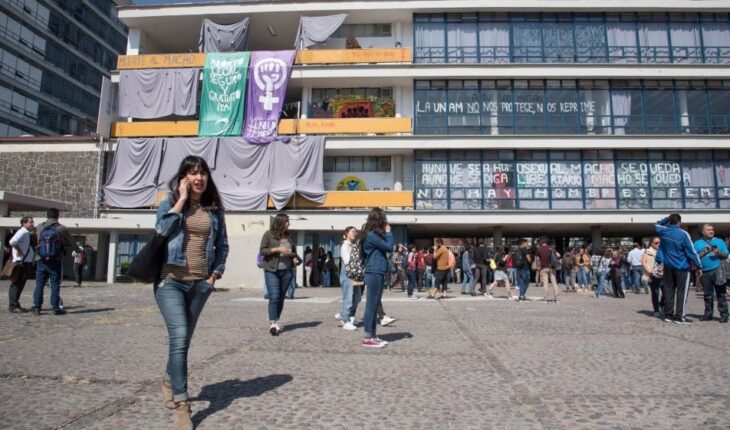Some students and workers of the National Autonomous University of Mexico (UNAM) found in the suspension of face-to-face activities due to the COVID-19 pandemic the possibility of stopping meeting their aggressors, but for others, this meant experiencing another type of violence: digital.
L, M and K, professors of the faculties of Science and Political Science, tell their experience with digital violence from anonymity, for fear that the aggressions against them will intensify. Last October they fired the teacher and the assistant who violated them, but they continue to go to Ciudad Universitaria to intimidate them, because they accuse that they were unjustly sanctioned.
“Last year, academics organized to demand better salaries and decent conditions within the university, which in the end triggered a conflict with another professor, who used institutional social networks to violate us in different ways,” says L.
The three academics, along with other professors who objected to the labor claims affecting student activities, were displayed with names and photographs in publications where they were accused of betraying the workers’ movement and on several occasions were insulted, in the case of women, with sexist expressions. That was why they decided to initiate a collective complaint before the University Court, and after several months they got the authorities to sanction the professor responsible and his deputy.
Read more | In Mexico, 7% of women suffered digital violence in 2021; Schoolmates, the main aggressors
In the period of August 2020 and the same month of 2021, even though face-to-face activities were suspended almost entirely due to the pandemic, 270 complaints of gender violence were filed at UNAM. 95% of those indicated were men, while 93% of the promoters were women.
According to information provided by UNAM to Political Animal Through a request for transparency, the majority of those indicated (160) were students, followed by academic staff (84), trusted staff (13), administrative staff (4) and people outside the community (2). In 7 of the cases, the alleged aggressor was not identified.
The alleged aggressors were mostly assigned to faculties (129), Faculties of Higher Studies (60), baccalaureate (41), institutes and centers (19), national schools (9) and in dependencies of the central sector (5).
Also in the case of the complainants, the majority were students (216), followed by academic staff (30), trusted staff (8), administrative staff (1) and 15 by people outside the community (15).
Most of the assaults occurred between peers (74), as in the case of L, M and K. Secondly, by type of relationship between accused and promot, there are those that occurred between teachers and students (63), followed by those that occurred between workers who at some point maintained a relationship (25).
Although the information provided by UNAM does not allow differentiating virtual aggressions from those that were committed in person, it is known that between August 2020 and the same month of 2021, 132 of the complaints were filed for psychological violence, 54 for sexual harassment, 53 for sexual abuse – which include for touching, kissing or the act of forcing someone to observe sexual acts – and 47 for sexual harassment.
In this year, UNAM determined 262 sanctions: 160 disciplinary sanctions against students, 78 administrative investigation for academics, 4 for basic administrative workers, and in 4 cases it was decided not to renew the contract for professional services, while 16 members of the trusted staff were sent a sanction notice.
Complaints up 156% in one year
From August 2021 to the same month of 2022 – when face-to-face activity increased in different university campuses – the number of complaints rose 156% compared to those filed in the same period of time the previous year, with 422 complaints.
They identified 395 people as alleged aggressors, of whom 90 per cent were men. Among the accused are 205 students, 105 academics, 22 trusted workers and 58 administrative staff. Most of them were attached to some faculty (148), followed by those of the FES (119) and those of the baccalaureate level (38).
In the case of people who filed complaints of gender violence, 93% were women, most of them undergraduate (255), baccalaureate (25) and graduate (14) students, followed by of administrative workers (47) and academic workers (43).
The complaints that were filed from August 2021 to the same month in 2022 were for psychological violence (172), sexual harassment (106), sexual abuse (87) and sexual harassment (25).
Of the 400 proceedings initiated, only 234 imposed a penalty: 5 were concluded because the person concerned submitted his resignation, in 2 he processed his retirement, in 4 the petitioner was withdrawn, in 48 the authorities determined that there were no elements to punish, in 2 the statute of limitations was prescribed, in 1 measures were implemented and 6 were inadmissible. Another 98 are still pending.
M celebrates that the collective complaint they filed prospered and the professor and the deputy were sanctioned, although he regrets that the process has taken months due to the administrative delays derived from the pandemic, and in any case he did not guarantee that they would stop being attacked, because now the two sanctioned go in person to distribute pamphlets and denounce with a megaphone from the esplanade of the Faculty of Sciences that they were rescinded for a political revenge.
“Even with the changes to the protocol (to denounce gender violence) that UNAM has announced, it is necessary to work hard to build safe spaces and that there is no complicity on the part of the authorities with the aggressors, that the punishment does not take so long to arrive and that it does not allow the violators to continue in the facilities. In my case, I have courage because I have denounced that these people come, and they have simply told me that the university can not do anything, that I have to go to the Public Ministry to issue a restraining order, because they can not be responsible, “he claims.
Lack of information and fear make it difficult to report and punish
M is currently finishing a master’s degree, also at UNAM, and from her dual role, as a teacher and as a student, she recognizes that for students the difficulties in raising their voices against the violence experienced in the university is greater, so she considers that she should also think about models that protect students against possible reprisals from aggressors.
“As a master’s student I would not dare to denounce, because I know that there are reprisals when processing the degree, and just like me, I see many classmates who, although they live abuse, decide to remain silent, and that is not right,” she adds.
K, for his part, points out that another of the difficulties for the complaints to prosper is that there is no clear information from the authorities in charge of sanctioning, “you have to be insisting that they tell you how the process is going, if it is necessary to expand any statement or what follows. In this case, we had guidance and knew more or less from our work, but it’s not easy.”
In addition, he claims that there is no real reflection in the people who come to be punished about why the acts they committed constitute gender violence, “and that means that later they are victimizing themselves because they were allegedly accused without foundations, they do not recognize their attitudes and there is no institutional work to sensitize them and help them understand. ”
That is why from their trench, L, M and K undertook a project to amplify the voice of those who denounce gender violence in the university, with the Facebook page “University Movement of Women and Dissidents-UNAM”, which initially emerged as a space to respond to the accusations made against them from the accounts of “Ciencias TV”, but now serves as a platform for different movements.
What we do at Animal Político requires professional journalists, teamwork, dialogue with readers and something very important: independence. You can help us keep going. Be part of the team.
Subscribe to Animal Político, receive benefits and support free journalism#YoSoyAnimal





